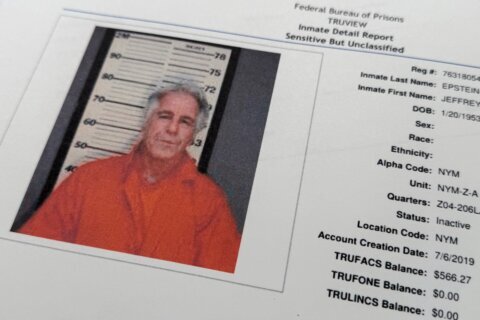By Nicole Chavez, CNN
(CNN) — Just before Christmas, Jessica Caraballo and her husband got the break they had long worked for.
In their three-year marriage, the 31-year-old and her husband, Shalique, have gotten job after job trying to support their children. She has driven for Uber, he embalmed bodies at an Atlanta funeral home, and she worked all night at a Walmart store.
It was just last month when things finally appeared to be falling into place. Caraballo, a Transportation Security Administration officer at Atlanta’s Hartsfield-Jackson International Airport, was promoted to a full-time position and her husband got a new job selling cars.
Buying a home, getting a second car and even just enrolling their three children in extracurricular activities at school would now be more than just dreams, they said.
But their joy lasted only a few days.
The partial government shutdown that began December 22 left Caraballo and 420,000 other federal workers across the country forced to work without a paycheck. Two weeks have passed and dozens of families like the Caraballos have put their lives on hold.
“Rent is due, light bill, gas bill, my car bill is due the 26th,” Caraballo said. “I already got my last paycheck and there’s no paycheck to come.”
“I don’t know when we would be able to celebrate birthdays, when we would be able to get ahead,” she added. “This is a pushback.”
Calling in sick is her last option
Caraballo has been fighting a cold for about a week but said she can’t afford to miss a day of work — even if she is not sure when she will get paid.
Friday afternoon, hours before she had to report to work, the family drove 45 minutes from their rental home in Forest Park, near the airport, to her parents’ home in Griffin. Caraballo’s parents would take care of her three kids — Danyelle, 10, Daellah, 7, and 5-year-old DaMara — while she and her husband went to work.
“I know that I have a partner, but he cannot do everything by himself. It takes two people in a household to keep it afloat,” she said, coughing at times outside her parents’ home.
Caraballo has accumulated paid sick time for months but is not allowed to take it during the shutdown. Instead, employees are offered leave without pay, she said.
“I’m going to keep going to work until they issue me a paycheck,” she said. “One thing I know is that I can’t afford to not go to work and then have them let me go.”
Her sense of duty keeps her motivated
When Caraballo gets out of bed at 3 a.m. and puts on her royal blue TSA shirt and black pants, the first thing that comes to mind, she said, are others: her family and the thousands of travelers she sees every day.
“Regardless of if you pay me or not, I’m doing my job because it’s not about Trump. It’s about the people who are flying on this airplane,” she said.
Her job, she said, is making sure travelers make it safely from Atlanta to whatever their destination may be.
“I would feel some type of way if you got in a plane and because (of) some lax … security your plane goes down,” Caraballo says. “It would weigh heavy on me if something was to happen to you when my job is to secure your flight.”
Caraballo began working for TSA last May, following the steps of her brother, who is also a TSA officer at the Atlanta airport. At first, she saw her job merely as a “stepping stone” before trying to join the Navy this year — but she said she quickly realized it’s something she enjoys.
“With this job, I do not have to fight myself to get up,” she said. “I like going to work no matter how early it is. Of course, I would love to get paid rather than to be like this, but I do love my job.”
She feels disrespected
Some 55,000 TSA employees screen around 800 million passengers a year. In a typical work shift — which lasts between five and 10 hours — they rotate every 30 minutes among tasks that include checking boarding passes, directing travelers to take off their shoes and screening them.
Since the shutdown, Caraballo’s brother, James Miller, said he’s been asked to work double shifts because of staffing shortages.
“First thing on my mind was, ‘No, don’t do it,’ but I understand that although we are in shutdown, its not the agency’s fault, so I didn’t want them to be saddled,” he said.
Both Miller and Caraballo said they “feel disrespected” by politicians in Washington and can sense an “extremely low” morale among their colleagues.
Yet they try to leave that sentiment outside the screening lines, especially when travelers acknowledge their struggle.
“Most of the people I’ve dealt with are very appreciative of us being there and said they are hoping and are praying for a quick resolution,” Miller said.
“It gives me hope that everybody is not only concerned about themselves. It just makes me feel like we are heading in a better direction.”
Her family lives paycheck to paycheck
As the Caraballos brace for the coming days or even weeks before the shutdown ends, they know their options are slim.
The Office of Personnel Management’s sample letters for employees to send to their creditors and mortgage companies during the shutdown, they said, are out of the question.
“I just don’t see how that is going to stand,” Caraballo said. “A piece of paper isn’t going to cut it. I know it wouldn’t cut it for me (if I were a landlord).”
When asked whether they are thinking about using their savings, Caraballo and her husband just started laughing.
“We live paycheck to paycheck right now, just trying to get ahead,” Caraballo said.
Like the Caraballos, about 78% of Americans who work full time live paycheck to paycheck, according to a study conducted by Harris Poll.
While Shalique Caraballo remains positive and falls back on his faith, the couple said they’ll really begin to worry if next week’s check doesn’t come.
“Government shutdown or not, we still gotta live, we still gotta move forward,” Shalique Caraballo said. “I would work day and night if I have to.”







